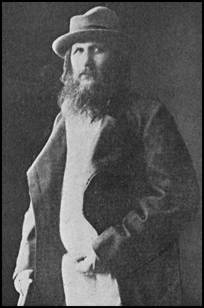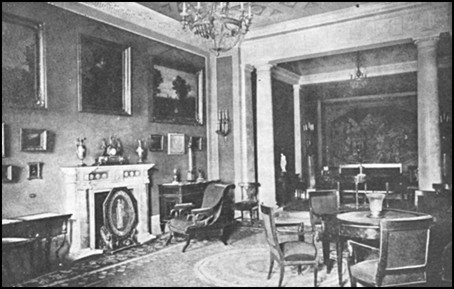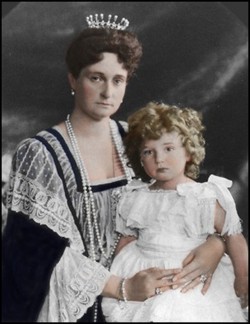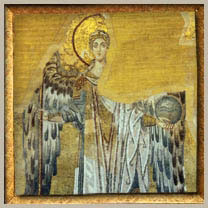Departure for the Crimea and return to Moscow - Winter at Tsarskoe Selo - Father John of Kronstadt - I visit our estates - Return to the Crimea - I leave to go abroad.
 Left: Rasputin.
Left: Rasputin.
In the autumn the Grand Duchess came with us to the Crimea. Her company, the new interests provided by the journey, the beautiful landscapes and splendid weather, all had an excellent effect on my mother's health. But soon after we arrived the improvement in her condition was checked by the streams of visitors who came to offer their condolences. As my mother was always very sweet and kindly, she saw them all. The result was a nervous breakdown, and she was once more obliged to stay in bed.
The Grand Duke Dmitri also came to stay in the Crimea, and hardly a day went by without his coming to see me. We used to talk together for hours and I was deeply touched by his friendliness. He asked me to regard him as a brother, and assured me that he would do everything in his power to replace Nicholas which he faithfully did for many years.
But I soon tired of this monotonous existence, and resolved to take up my work in Moscow again. When I spoke to the Grand Duchess about this, she advised me not to leave my mother until she had completely recovered. The doctors, alas, gave me little hope of that. They said that her condition might improve, but that she would never regain her health entirely.
I could not make up my mind what to do: on the one hand, I felt I ought to stay with my mother at Koreiz and, on the other, I knew that the life I was leading was not only purposeless but unhealthy. I was still undecided, when I discovered that the Grand Duchess and my mother had made up their minds it was high time I was married, what was more, they had even chosen a wife for me. But in thus disposing of me they had not reckoned with my independent spirit; they already saw the young wolf turned into a lamb. In many respects, however, I was a wolf in sheep's clothing. Come what might, I intended, if I married, to choose my own wife. The idea that they wished to keep me under their thumb, so to speak, roused all my rebellious instincts and I longed to break away from it all. I definitely decided to go to Moscow to resume the work which interested me so much.
I never regretted this decision; in caring for the poor, I gradually recovered my peace of mind.
A few weeks later, my parents, the Grand Duchess and Dmitri returned from the Crimea, and I went with them to St. Petersburg and to Tsarskoe Selo where we spent the winter.

The Grand Duke Alexis Alexandrovich, the Tsar's uncle, died that year and the count went into mourning. The Grand Duke Vladimir made this the excuse for asking the Tsar to allow his son, the Grand Duke Cyril, to return to Russia so that he might attend his uncle's funeral. The Grand Duke Cyril had been exiled when he married his first cousin, Princess Victoria of Great Britain, who was the divorced wife of the Grand Duke of Hesse, the Tsarina's brother.
I knew the Grand Duke of Hesse very well, for he had often stayed with us at Arkhangelskoe. He was a very good-looking fellow, gay and attractive.. He had a passionate love of beauty and boundless imagination. Having taken it into his head one day that his white pigeons were not in keeping with the old stones of his palace, he had their feathers dyed sky blue. His marriage was not a happy one, and the Grand Duchess divorced him and married her cousin Cyril. This created a great scandal at court where neither divorces nor marriages between first cousins were tolerated.
 Left: Alexandra with Alexis.
Left: Alexandra with Alexis.
The Tsarina was very bitter, as she considered the marriage a personal affront to her brother; she urged the Tsar to forbid the Grand Duke Cyril's return to Russia, and to deprive him of his title and the privileges that went with it. The exiled couple finally won their way back to favor, but always bore a grudge against the Tsarina.
A short time after the Grand Duke Alexis' death, that of Father John of Kronstadt saddened all Russia. During his lifetime Father John had already been considered a saint. Ordained at twenty-six, at the Cathedral of St. Andrew of Kronstadt, he very quickly won the love and veneration of the faithful. Nearly all his time was spent in visiting the poor and the sick; be gave them everything he possessed, to his last penny, and often walked home barefoot, having given his shoes to some beggar he had met on the way. Innumerable pilgrims flocked to him from all parts, including even Moslems and Buddhists who begged for his intercession on behalf of their sick ones. His prayers often brought about cures which were considered miraculous.
After the birth of one of my brothers, my mother was in such a serious condition that the doctors despaired of saving her life. Father John was sent for when she was already in a coma, but as he entered the room my mother was seen to open her eyes and stretch out her arms to him. Father John knelt by her bed, and began to pray; when he rose, he blessed my mother and said simply: "God will help her and she will recover." And she was indeed soon out of danger.
As he found it impossible to hear the confessions of such large numbers of people, Father John instituted mass confessions. Several witnesses told me that on such occasions the noise in the church was unbelievable, as each person wanted to be heard above the others. Women's voices, being the shrillest, always drowned those of the men. A sect of women calling themselves the Janites caused Father John a great deal of trouble. They were convinced that he was the reincarnation of Christ, and often made hysterical scenes, flinging themselves on him and even biting him until the blood flowed. He generally refused to give them Holy Communion.
He had retained a deep feeling for my mother and often came to see her when I was a child. I shall never forget his clear, penetrating gaze and kindly smile. I saw him for the last time in the Crimea, shortly before his death, and shall never forget what he said to me then: "Divine inspiration is for the soul what respiration is for the body: just as a man cannot exist without air, the soul cannot live without the breath of the Holy Spirit."
Father John was seventy-eight when, while on his way to visit a dying man, he was lured into a trap and set upon by ruffians. He owed his life to his coachman, who succeeded in rescuing him and brought him home, half dead. Father John, who never entirely recovered from the effects of this assault, died several years later without having revealed the names of his aggressors. His death was a great misfortune for Russia, and particularly for the Tsar and Tsarina who lost in him a wise and faithful counselor.
During the course of that same winter, a mysterious event reminded me of the promise I had exchanged with my brother, that the first of us to die would appear to the other. I was staying at the Moika St. Petersburg for a few days. I awoke one night and, driven by some irresistible force, I rose, crossed my bedroom and went toward my brother's room. It had been kept. locked since his death. Suddenly I saw his door open, and Nicholas appeared on the threshold. His face was radiant, he stretched out his arms to me... I was about to leap toward him when the door closed gently and I saw no more.
Our life at Tsarskoe Selo was very monotonous. With the exception of Dmitri I scarcely saw a soul. Several times in the course of the winter the Tsarina, who was at the Alexander Palace, sent for me. She wished to talk to me about my future and offered to become my spiritual guide. But while it was easy for me to talk freely with her sister I never felt at ease with the Tsarina: Rasputin's shadow always seemed to come between us.
"Any self-respecting, honest man," she said to me once, "should serve in the Army or take up a position at court. I am surprised that you do neither."
I replied that as I had a horror of war I was naturally strongly averse to a military career, and that, as far as a position at court was concerned, I was too independent and too fond of plainspeaking ever to make a good courtier. I could not imagine myself as a civil servant of any kind. I would some day have an enormous fortune and all the responsibilities that went with it. I would have to look after my estates and my factories, and see to the well-being of my peasants. This task, if well done, would be my way of serving my country and therefore of serving my Emperor.
The Empress noticed that I had put the name of Russia before that of the Tsar: "But the Tsar is Russia!" she exclaimed.
At that moment, the door opened and Nicholas II entered the room.
"Felix's ideas are absolutely revolutionary," said the Empress to him..
The Emperor opened his eyes in astonishment, turned his kindly gaze on me, but remained silent.
My mother, whose health was improving, was able gradually to take up some of her activities again and attend to her many charities. My father was seldom at home and spent most of his evenings at his club. I stayed with my mother night after night reading aloud to her while she knitted, but such a monotonous and practically idle life could not last indefinitely. In the spring, I decided to take a long journey through Russia to visit our estates and various undertakings. This idea had the full approval of my parents; my father put his railway coach at my disposal and I set out with our chief agent, my father's secretary, and several other friends.
The journey lasted over two months; I was full of my own importance, and felt like a young king visiting his states. I was enchanted by the beauty and variety of the regions I visited, and was greatly touched by the welcome I was given everywhere. The peasants in their national costumes greeted me with songs and dances; many of them knelt before me. Our coach in the train was filled with flowers and presents of all sorts: chickens, geese, ducks and pigs in such quantities that a second car had to be coupled to ours, and when the journey ended in the Crimea, where my parents had arrived for the autumn, I felt like a conquering hero returning with the spoils of war.
But after that the monotony and idleness of the life I led became again unbearable. I was then twenty-one and felt the urgent need of a change. I thought of going abroad. I remembered that one of my friends, a former naval officer, Basil Soldatenkoff who lived in Paris, had advised me to go to Oxford. I decided to do so. When I told the Grand Duchess she tried at first to dissuade me, but at last she gave way and promised to do her best to get my parents' consent. This proved to be a long and difficult task. However, without doubting for an instant that my parents would in the end agree, I wrote Basil announcing my impending arrival in Paris, where I expected to spend a few days on my way to England.
My parents finally consented, on the condition that I would not stay away more than a month. That was already a victory.
A few days before I left, the Tsarina sent for me in Livadia; I found her seated on the terrace, embroidering. She told. me that she was much surprised that I was leaving my sick mother, and tried for a long time to dissuade me from going. She pointed out that many young men who, like myself, left Russia, found themselves so much out of their element when they returned home that they ended by settling down abroad. I had no right, she said, to run the risk of following their example. My duty was to stay she said, to run the risk of following their example. My duty was to stay in Russia and serve the Tsar.
I assured her that I had no intention of remaining abroad, for I loved my country more than anything in the world, and that my purpose in going to Oxford was to fit myself to be of greater use to Russia and my Emperor on my return.
My reply apparently displeased the Empress, for she changed the subject. On dismissing me, she asked me to call on her sister Princess Victoria of Battenberg, who lived in London, and gave me a letter for her. She wished me a happy journey and expressed the hope of seeing me that winter at Tsarskoe Selo.
The day I left, a religious service was held in our chapel to ask for the protection of Heaven on me. It was both touching and funny; everybody cried, kissed and blessed me. One would have thought that I was starting out on a dangerous expedition to the North Pole or to Tibet rather than on a short journey to England.
Finally I left, accompanied by my faithful Ivan, and reached Paris without incident except for the loss of my passport at the German frontier.
Basil Soldatenkoff met me at the station. He was a fine fellow: intelligent, athletic, attractive, extremely headstrong and dynamic. He called his racing car "Lina," after the beautiful Lina Cavalieri with whom he was very much in love. Women doted on this great, strapping, handsome youth who ran his life as he did his car, at top speed. He had married a charming woman, Princess Helen Gortebakoff, but the marriage was not a happy one. After a few days in Paris, I left for England with Basil.
A big thanks to Rob Moshein for scanning and correcting this text.
For questions or comments about this online book contact Bob Atchison.

